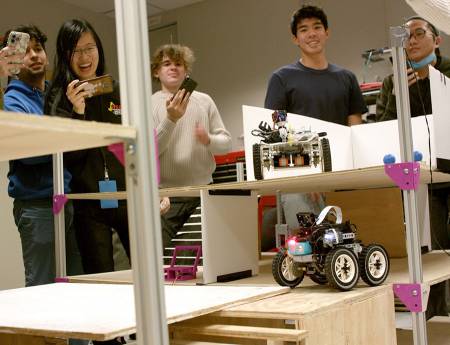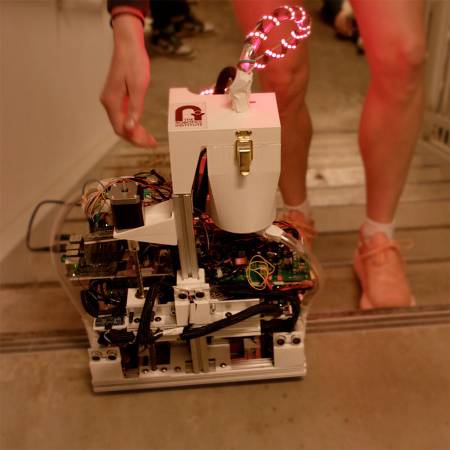Robotics Major in the School of Computer Science
Carnegie Mellon University is excited to announce the creation of a new primary major in the field of robotics.
Housed within the School of Computer Science, the Bachelor of Science in Robotics (BSR) emphasizes problem solving and “systems thinking” across disciplines and domains.
Robotic technology can make cars and airplanes safer or help people with physical limitations lead healthier, richer lives at home. Robotics can clean up crippled nuclear reactors, explore the surfaces of other planets or enable sustainable agriculture. Robots can change the world – for the better.
The robotics industry is seeking talented college graduates who are multi-disciplinary, with skills ranging from software to hardware to interface design.
At CMU, students will learn to use robotics to solve real-world problems while mastering core concepts of computer science including data structures and programming.
Build your future in the ultimate makerspace.
Carnegie Mellon University established the first academic department in the United States dedicated to robotics when it created the Robotics Institute in 1979. Since then, it has been a world leader in robotics research and graduate education. Now, starting in the Fall of 2023, it is proud to offer an undergraduate Bachelor of Science in Robotics (BSR).


Core Concepts
Typical Robotics Major Pathway
For full list of courses and descriptions see the Robotics Program Course Catalog
First Year Fall Courses
| Course Code | Course Title | Units |
|---|---|---|
| 07-128 | First Year Immigration Course | 1 |
| 15-122 | Principles of Imperative Computation | 12 |
| 15-151 | Mathematical Foundations for Computer Science | 12 |
| (or) 21-127 Concepts of Math | ||
| 21-122 | Integration and Approximation | 10 |
| 76-101 | Freshman Writing Requirement | 9 |
| 99-101 | Computing @ Carnegie Mellon | 3 |
| Total: | 47 | |
First Year Spring Courses
| Course Code | Course Title | Units |
|---|---|---|
| 16-170 | Concepts of Robotics | 5 |
| 15-213 | Introduction to Computer Systems | 12 |
| 21-241 | Matrices and Linear Transformations | 11 |
| xx-xxx | GenEd – Science & Engineering Elective | 9 |
| xx-xxx | GenEd – Economic, Political & Social Inst. | 9 |
| Total: | 46 | |
Second Year Fall Courses
| Course Code | Course Title | Units |
|---|---|---|
| 16-220 | Intro to Robotics Building Practices | 12 |
| 36-xxx | Probability (36-218 or 36-225) | 9 |
| 16-211 | RoboMath | 12 |
| xx-xxx | GenEd – Cognition, Choice & Behavior | 9 |
| Total: | 42 | |
Second Year Spring Courses
| Course Code | Course Title | Units |
|---|---|---|
| 16-299 | Intro to Planning and Control | 12 |
| 16-311 | General Robotic Systems | 12 |
| 15-251 | Great Ideas in Theoretical Computer Science | 12 |
| xx-xxx | GenEd – Cultural Analysis | 9 |
| Total: | 45 | |
Third Year Fall Courses
| Course Code | Course Title | Units |
|---|---|---|
| 16-384 | Robot Kinematics and Dynamics | 12 |
| 16-385 | Computer Vision | 12 |
| xx-xxx | Humanities / Arts Elective | 9 |
| xx-xxx | Humanities / Arts Elective | 9 |
| xx-xxx | Free Elective | 9 |
| Total: | 51 | |
Third Year Spring Courses
| Course Code | Course Title | Units |
|---|---|---|
| 16-xxx | RI Elective | 12 |
| 16-xxx | RI Elective | 10 |
| xx-xxx | GenEd – Science & Engineering Elective (3 of 4) | 9 |
| xx-xxx | GenEd – Humanities and Arts Elective (2 of 3) | 9 |
| Total: | 45 | |
Fourth Year Fall Courses
| Course Code | Course Title | Units |
|---|---|---|
| 16-450 | Systems Engineering | 12 |
| xx-xxx | Ethics Elective | 9 |
| xx-xxx | GenEd – Science & Engineering Elective (4 of 4) | 9 |
| xx-xxx | RI Elective (3) | 10 |
| Total: | 40 | |
Fourth Year Spring Courses
| Course Code | Course Title | Units |
|---|---|---|
| 16-474 | Robotics Capstone | 12 |
| xx-xxx | SCS Elective | 10 |
| xx-xxx | GenEd – Humanities and Arts Elective (3 of 3) | 9 |
| xx-xxx | Free Elective (3) | 9 |
| Total: | 40 | |
Choset’s final class project involves a miniaturized “search and rescue”.
Program Learning Objectives
Unlock boundless possibilities through our transformative program. Delve into the following concepts and more, empowering you to lead groundbreaking innovations and shape the future of technology. Embrace this opportunity to unleash your full potential!
-
Solve Real-World ProblemsLearn how to use robotics to tackle real-world challenges and drive solutions.
-
Master Core ConceptsDeepen your understanding of computer science fundamentals.
-
Mathematical FundamentalsGain expertise in the mathematics essential for robotics.
-
Algorithmic ConceptsAcquire knowledge of robotics algorithms and machine learning.
-
Robotics ComponentsExplore the various components that make up robotic systems.
-
Design and PrototypeHands-on experience in designing and prototyping robots.
-
Interdisciplinary TeamsCollaborate effectively in diverse teams for innovative solutions.
-
Ethical ImplicationsUnderstand the ethical considerations in robotics technology.
-
Communication SkillsDevelop effective communication and presentation abilities.
In-Depth from Day One
Built upon a solid foundation of mathematical fundamentals permeating robotic systems known as “RoboMath”, the Bachelor of Science in Robotics will provide the opportunity for undergraduate students to master algorithms and use them to design, prototype, fabricate and test their own robots.
While learning how to work effectively as part of an interdisciplinary team, students will also explore the greater ethical and societal implications of robotics and build critical communication and presentation skills.
The curriculum includes courses that provide a deeper understanding of control, movement, sensors, systems engineering and cognition and reasoning.
TartanPest, a robot project aiming to create an automated solution to the invasive Spotted Lanternfly problem has undergraduates on the team.
In the Lab: Our World-Class Facilities
In addition to our exceptional faculty, Carnegie Mellon offers robotics students an incredible array of labs and research facilities in which to learn, innovate and explore. With more than 40 labs and groups on campus, students immerse themselves in hands-on learning and gain a deeper understanding of robotics alongside peers and leaders in the field.
To explore some of the exciting projects currently under development at Carnegie Mellon’s Robotics Institute, visit some of our labs below, or view the full listing of groups and labs by visiting the Robotics Institute website.
- Biorobotics (includes the Snake Robot project)
- CREATE: Community Robotics, Education and Technology Empowerment (includes the Bow Leg Hopper and ChargeCar projects)
- CORAL Group (includes the CoBot project)
- Personal Robotics Lab (includes the HERB project)
- The Robot Learning Laboratory (includes Minerva)
- Field Robotics Center (includes Red Rover, Scarab, Boss, Hyperion, and Zoe)
Exciting, Challenging Courses
It all begins with Intro to Robotics (16-311) where students are encouraged to vigorously explore major concepts. Some of the most well-known projects are the creation of individual Rube Goldberg machines and a miniaturized Urban Search and Rescue mission. Other courses, like Robot Kinematics and Dynamics (16-384), currently explore methods of controlling the Hebi robotic arm, among other topics. The videos in the playlist below show some highlights from these and other courses.
See More, Learn More
Want more? Check out the Robotics Institute’s video page for the latest student and faculty research and seminars. Or dive into the Robotics Institute research. It’s one of the best ways to learn the incredible breadth of experiences and potential opportunities available to students.